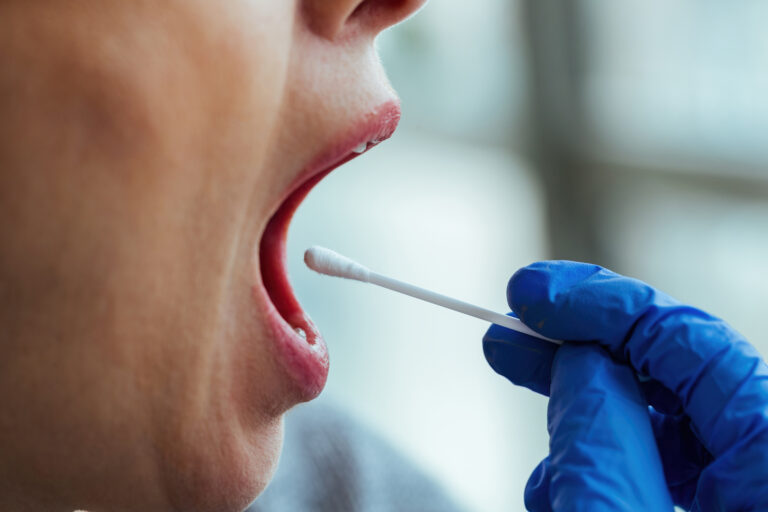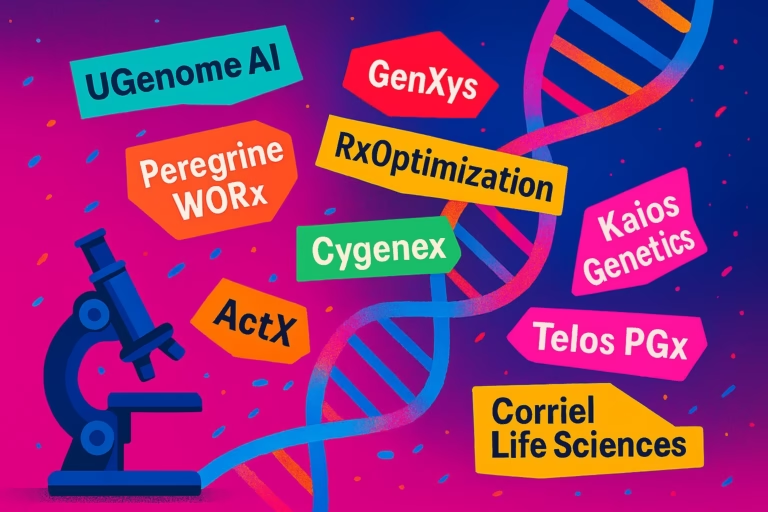With the rise of direct-to-consumer (DTC) options, more people are exploring whether they should take a pharmacogenomics test at home to understand how their genes affect their response to medications.
But just because you can order a PGx test kit online doesn’t mean it’s the right move for everyone. In this guide, we’ll walk you through what pharmacogenomics is, the pros and cons of testing at home, how to choose a kit, and what to do with the results.
Let’s start with the basics.
What Is Pharmacogenomics?
Pharmacogenomics (PGx) is the study of how your genetic makeup influences the way your body processes medications. Everyone metabolizes drugs differently, and PGx testing can reveal important details, such as:
- Whether a medication will work effectively for you
- Whether you’re at increased risk for side effects or toxicity
- What dosage might be best for your metabolism
For example, some people have variations in the CYP2D6 gene that make it harder to process certain antidepressants or pain medications. Others might have a variant in SLCO1B1, increasing the risk of statin-related muscle pain.
With this kind of insight, your healthcare provider can personalize your prescriptions, helping to avoid the frustrating (and sometimes dangerous) process of trial and error.
Why Are At-Home Pharmacogenomics Tests Becoming Popular?
At-home pharmacogenomics testing is gaining popularity because it offers a modern, patient-centered approach to understanding how your genes affect your response to medications. One of the biggest drivers of this trend is convenience. Instead of scheduling a doctor’s appointment, sitting in a waiting room, or navigating a busy lab, people can now order a kit online, collect a cheek swab from the comfort of their home, and receive results digitally within days or weeks. It’s quick, easy, and fits into busy lifestyles.
But convenience is just one part of the appeal. There’s also a growing desire among consumers to take a more active role in their healthcare decisions. People are no longer content to follow one-size-fits-all treatment plans. They want to know how their bodies work and how they can make smarter choices when it comes to medications. A pharmacogenomics test at home can feel empowering—like having a personalized roadmap that guides better treatment.
Another factor fueling interest is frustration with the traditional healthcare system. For many, getting the right diagnosis or medication is a slow, trial-and-error process filled with insurance hurdles, long wait times, and communication gaps. Direct-to-consumer genetic testing skips some of these roadblocks by giving people immediate access to their genetic insights—no referral or prior authorization required.
Mental health is another area where at-home PGx testing is making a real impact. Many individuals taking antidepressants, ADHD medications, or mood stabilizers struggle with side effects or lack of response. Knowing how you metabolize these drugs can be a game-changer, helping patients and their doctors choose treatments more effectively and avoid months of guesswork. All of these factors combined are making at-home pharmacogenomics testing not just a trend, but a tool more people are turning to for faster, more personalized care.
What a Pharmacogenomics Test at Home Can Tell You
Most at-home pharmacogenomics test kits will screen for common variants that affect drug metabolism. These include genes involved in:
- Enzymes that break down drugs (like CYP2C19, CYP2D6, CYP3A4)
- Transporters that affect how drugs move through the body (SLCO1B1)
- Receptors or targets that influence drug effectiveness (like VKORC1 for warfarin sensitivity)
You’ll usually get a report that categorizes you as:
- A normal or ultra-rapid metabolizer for specific drugs
- At risk for side effects
- Likely to need a higher or lower dose
- In some cases, the medication may be flagged as ineffective altogether
Some tests also bundle in additional health risk data, such as disease predispositions. Be sure to check exactly what’s covered.
Should You Really Do a PGx Test Without a Doctor?
Here’s where things get tricky. While pharmacogenomics tests are powerful tools, interpreting the results isn’t always straightforward. That’s because:
- Drug response depends on more than just your genes, it also involves age, weight, other medications, diet, and liver or kidney function.
- Not all drug-gene interactions are clinically actionable.
- The science behind some gene-drug relationships is still evolving.
Without a genetic counselor or pharmacist trained in PGx, you could easily misinterpret the report. For example, you might stop taking a medication based on the test alone, which could be dangerous.
That said, some home test companies now offer consults with pharmacists or partner with clinicians who can help guide you. If you’re thinking about testing, this is a must-have feature.
Who Should Consider a Home Pharmacogenomics Test?
You might benefit from a pharmacogenomics test at home if:
- You’ve had adverse reactions to medications in the past
- You’re starting treatment for mental health, pain, or cardiovascular disease
- You have a family history of drug sensitivity
- You take multiple medications (polypharmacy) and want to reduce the risk of interactions
- You’re a caregiver looking to better understand medication risks for a loved one
- You want to bring useful data to your doctor for personalized treatment
What to Look for in a Good At-Home PGx Test Kit
Not all tests are created equal. Here’s what to check before clicking “buy”:
CLIA Certification
Make sure the lab that processes your sample is CLIA-certified (Clinical Laboratory Improvement Amendments). This means the lab meets high-quality standards and your results are legally allowed to be used for medical decisions.
Drug-Gene Panel Coverage
Some tests only screen for a few genes, while others offer a more comprehensive panel. Look for kits that test at least CYP2D6, CYP2C19, CYP3A4, CYP3A5, SLCO1B1, UGT1A1, and VKORC1, these affect a wide range of drugs.
Actionable Reporting
The best tests don’t just show your genotype, they offer clear, clinically relevant guidance. Look for color-coded reports, dosage suggestions (based on CPIC or FDA guidelines), and drug interaction flags.
Provider Support
Can you talk to a pharmacist or genetic counselor? Can the results be sent to your doctor or uploaded to your electronic health record (EHR)? This adds major value.
Privacy and Consent
Make sure the company lets you control how your data is stored and whether it can be used for research. Read the fine print before submitting your DNA.
Best Pharmacogenomics Test Kits You Can Order at Home (2025)
Here are some trusted companies offering pharmacogenomics tests at home:
1. GeneSight® Psychotropic Test
- Focus: Mental health medications (antidepressants, antipsychotics, mood stabilizers)
- Clinician ordered; samples collected at home
- Includes pharmacist consult and physician report
- Insurance may cover it with doctor’s involvement
2. Rxight®
- Tests 50+ genes and 200+ medications
- Includes cardiovascular, pain, anesthesia, and mental health drugs
- Offers detailed reports and support from pharmacists
3. 10X Health System: The Gene Test
- Focuses on key genes affecting medication metabolism, nutrient absorption, and overall health
At-home cheek swab collection with fast turnaround time - Includes physician-guided results and personalized health recommendations
- Designed to optimize treatment plans and reduce trial-and-error with medications
4. OneOme® RightMed Test
- Developed in partnership with Mayo Clinic
- Offers online ordering through a provider
- Integrates with EHRs and offers provider support
What to Do After You Get the Results
Getting your results is just the beginning. Here’s how to use them wisely:
- Share with your doctor or pharmacist
Bring the report to your next medical appointment. Your provider can help you adjust current prescriptions or plan for future needs. - Store the results safely
Pharmacogenomic results usually don’t change. Save them in your personal health records and consider uploading them to your EHR or patient portal. - Revisit when medications change
You don’t need to re-test your genes, but as new drugs are prescribed or your health conditions evolve, reinterpreting the data may be useful. - Don’t make medication changes without supervision
Even if the report suggests a drug might not work for you, always consult your provider before stopping or switching a medication.
Is an At-Home PGx Test Worth It?
Yes, but with a few caveats.
A pharmacogenomics test at home can offer real, actionable insights that help tailor your treatment and avoid side effects. But to truly benefit, you need:
- A test from a reputable, certified lab
- A clear understanding of the report
- Guidance from a pharmacist, doctor, or genetic counselor
- Willingness to use the results in partnership with your healthcare provider
If you’re dealing with mental health meds, chronic pain, or have a history of poor drug responses, the investment can pay off in better health outcomes and fewer unwanted surprises.
Just don’t treat it like a magic bullet. PGx is a powerful tool, not a standalone solution. When used correctly, it can help turn guesswork into clarity and bring confidence to your care.
Thinking of ordering a pharmacogenomics test at home?
Make sure you choose a reliable provider, review what genes and medications are included, and plan to go over your results with a healthcare professional. When used wisely, it could be one of the most valuable tools in your personal health journey.
FAQs
Q: How much does a pharmacogenomics test at home cost?
A: Prices range from $150 to $500 depending on the company and panel size. Some insurance plans may cover PGx tests if ordered by a provider.
Q: Are at-home PGx tests accurate?
A: Yes, if processed by a CLIA-certified lab. Always check the lab credentials before purchasing.
Q: Can I get results without a doctor?
A: Some kits allow this, but many tests (especially the most reliable ones) require a physician’s order or provide provider support to help interpret the data.
Q: Will the test cover all the medications I take?
A: Not always. Most kits focus on commonly prescribed drugs. Check the company’s drug-gene list or ask customer support for clarification.
For more great articles, go here.
Enhancing the search engine optimization (SEO) for your Pharmacogenomics Test is crucial for maximizing its benefits within your personal health regimen. The cost of a Pharmacogenomics Test conducted at home varies between $150 to $500, depending on the test provider and the scope of the panel. While some at-home PGx tests are accurate, it is imperative to ensure that they are processed by a CLIA-certified laboratory to guarantee reliability. Additionally, while some kits may offer results without a doctor’s involvement, the most dependable tests typically require a physician’s order or provide professional assistance for result interpretation. It is important to note that not all medications may be covered by these tests, as they predominantly focus on commonly prescribed drugs. For further insightful articles, click here.





